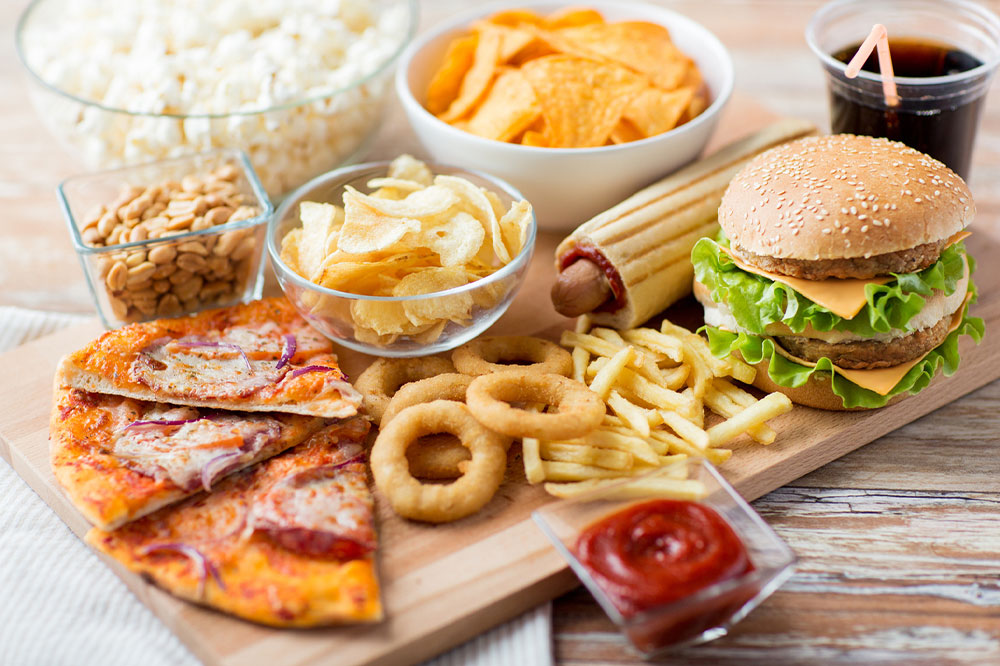
6 foods that trigger cancer and increase the risk
Cancer triggers an abnormal growth or mutation of cells in the body. These cells can potentially destroy healthy tissue in the vicinity and travel to distant organs, using the lymph nodes after metastasis. A genetic mutation is the main cause of this condition, and, sadly, there is no cure. The condition can at best be managed to improve quality of life by making healthy changes in food and lifestyle and exploring medications/treatments.
Foods that help reduce the risk
Processed meats
Meats are a good source of protein, especially leaner low-fat cuts. However, most types of meat are preserved by curing them in salt and spices or smoking and even packing the meat into cans. This prolongs the shelf life of meats like beef jerky, ham, corned beef, sausage, salami, and even hot dogs and increases the risk of carcinogens in the food. Cured and processed meat is linked to colorectal cancer. Red meats, like beef, pork, lamb, and veal, that are not cured increase the risk of cancer due to the number of additives and nitrates present in the raw cuts.
Salty, fried, and processed foods
The body needs to maintain a perfect sodium balance to promote the healthy function of vital organs. Any spikes due to excess consumption of salt may trigger unnatural responses that increase the risk of certain types of cancer. For example, salting is a popular method of preservation that is also used for curing different types of fish. However, this process may trigger a release of carcinogens by-products that increase the risk of cancer. The same goes for processed, fried, and baked foods that have excess salt. These foods also contain saturated fats, trans fats, preservatives, and additives to increase the product’s shelf life. Daily consumption of these foods can have an adverse effect on overall health.
Overcooked foods
Cooking methods can also have an adverse impact on the produce we eat. Using high heat or overcooking with techniques like grilling, barbequing, or pan-frying can release a host of carcinogens found in different cuts of meat. Cooking on the open flame triggers the release of PAH and HCA compounds that are known to alter the DNA of healthy cells. Even starchy vegetables that go with these meats release acrylamides. A high concentration of these compounds can result in nerve damage, increasing the risk of neurological disorders.
Foods rich in sugar
The consumption of sugar in excess increases the risk of other health complications like diabetes and triggers weight gain. These unhealthy changes result in oxidative stress and cause inflammation, thereby increasing the risk of certain types of cancer. In addition, sugar-based cereals, baked goods, and confectionaries trigger certain metabolic changes in the body that affect the immune response.
Foods made with refined carbohydrates
Carbohydrates are essentially fuel for the body. The digestive system breaks down carbs consumed from foods and beverages to release the necessary energy for all bodily systems. However, not all carbs are good for health. Refined carbohydrates, often referred to as simple carbs, can trigger an imbalance in blood sugar levels. Foods like white rice, pasta, white bread, and other consumables made out of refined grains increase the risk of colorectal cancer upon regular consumption.
Alcohol and sugary beverages
Consuming alcohol can increase the risk of cancer of the mouth, esophagus, throat, breast, stomach, liver, and bowel. When the liver breaks down the alcohol consumed, the process releases a carcinogenic compound into the body. Studies show that this compound harms the immune system function, promotes DNA damage, and results in oxidative stress, causing cell damage. Alcohol consumption also triggers an abnormal increase in estrogen levels among women, thus increasing the risk of breast cancer. Sweetened beverages are also rich in sugar and preservatives that trigger unhealthy weight gain and affect metabolic activities adversely.
Some of the following medications are suggested for ongoing cancer treatments, while others may be prescribed for prevention or recovery. Dosage will vary depending on the protocols established for different types of cancer treatment.
Neulasta®
Neulasta® OnPro is one of the prescription medications that is suggested during chemotherapy. The dosage is designed to reduce the risk of infections among adults, especially those with low immunity due to the lack of white blood cell boosters. The next day pill can be taken at home as instructed by the doctor.
Ibrutinib
Marketed under the brand name IMBRUVICA®, this oral pill is a Bruton’s tyrosine kinase (BTK) inhibitor that can prove to be a viable alternative to chemotherapy. The medication mainly helps manage B-cell malignancies that have been overserved among different types of cancer.
VENCLEXTA®
This prescription medication is mainly suggested for those who are diagnosed with different types of lymphoma and leukemia. It is an active oral therapy that has potent qualities to fight and counter certain types of blood cancer.
KRAS-G12 C inhibitor
Genetic mutation is one of the main causes for cancer cells to develop and affect healthy tissues. Kirsten rat sarcoma (KRAS) genes are linked to the development of colorectal, pancreatic, and small cell lung cancers. KRAS-G12 C inhibitors render the KRAS proteins neutral and reduce the risk of a mutation that can lead to potential cancer development.
CAR T-Cell Therapy
T-Cells are a type of immune system cells found in the body. CAR T-cell therapy modifies these immune cells to attack and prevent cancer cells from developing. Special receptors that bind to these proteins and enable the elimination of T-cells are also synthesized. The modified cells are reintroduced back into the body through infusion to counter specific types of cancer.